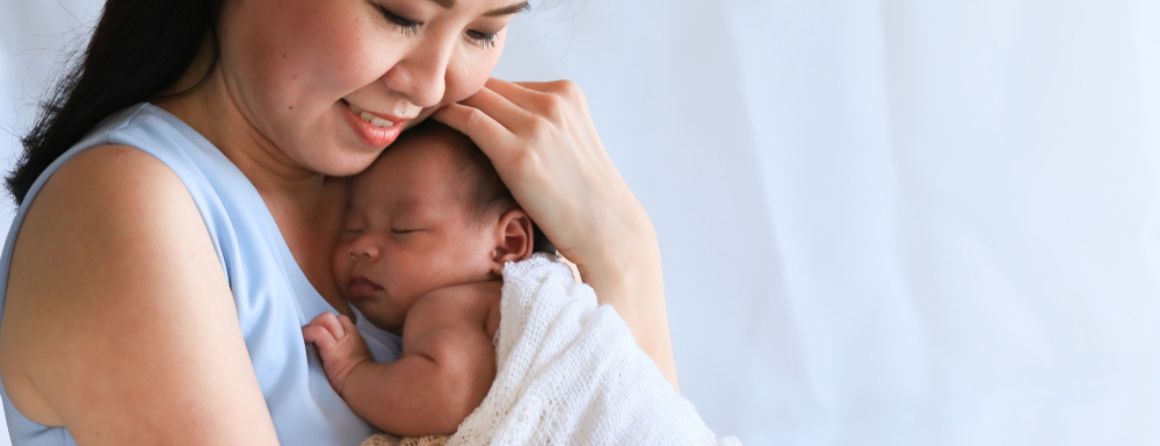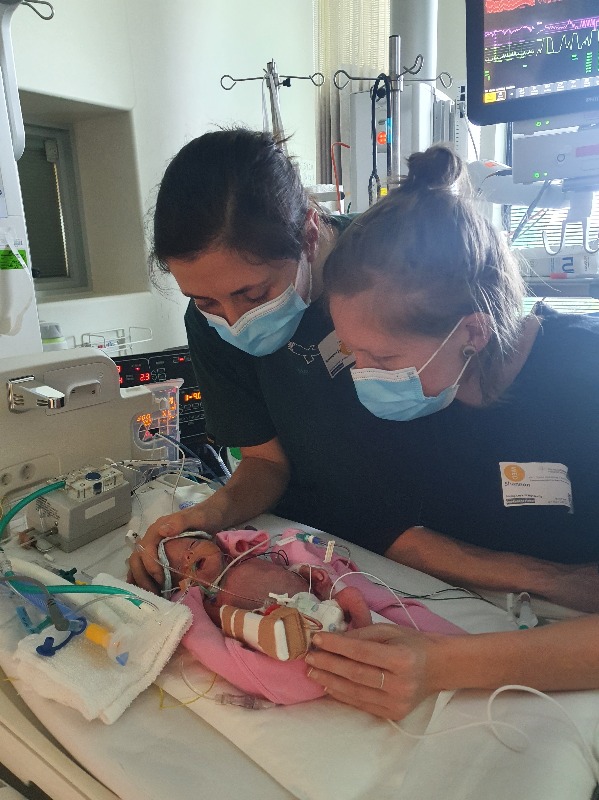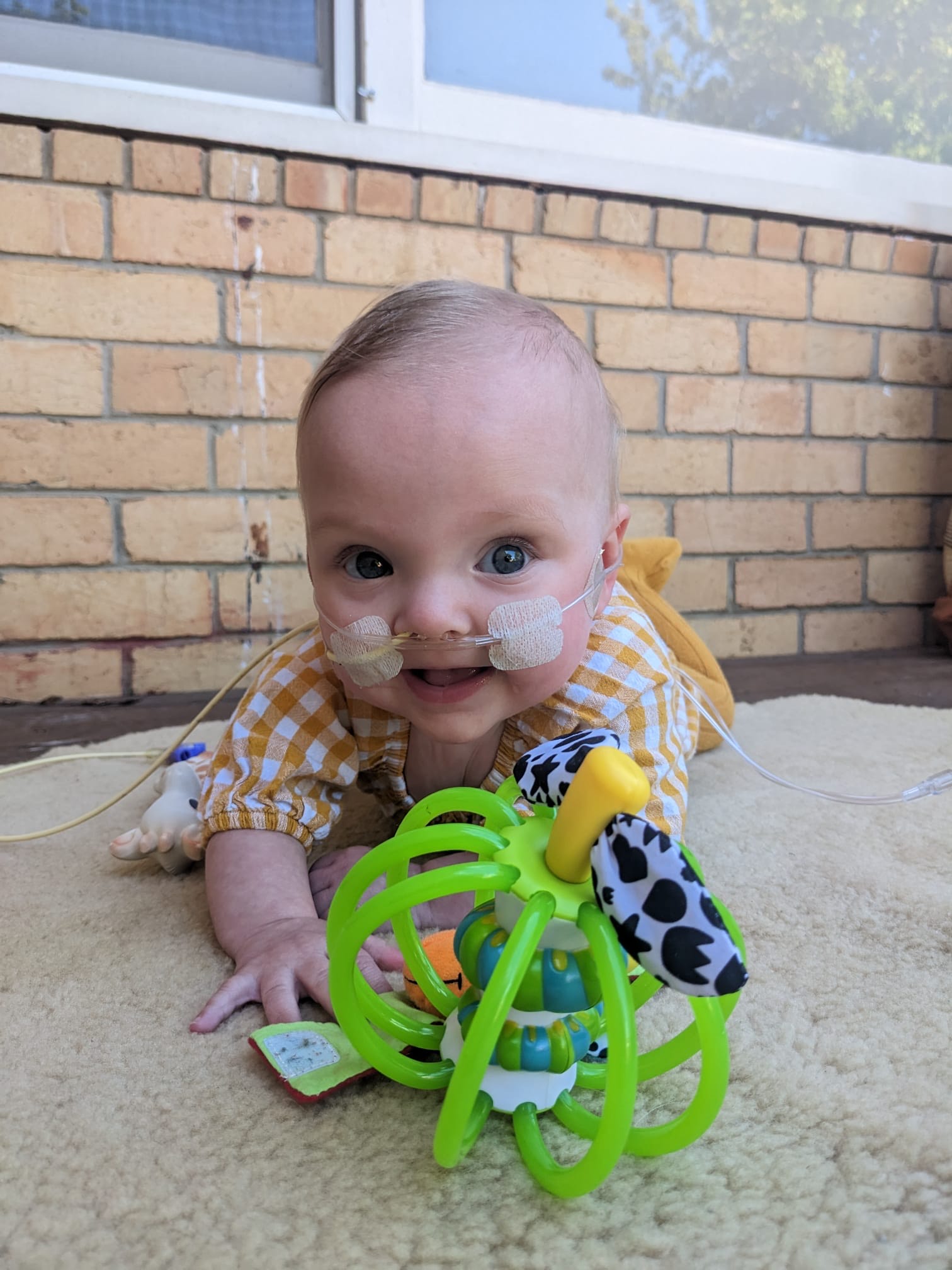Most babies born to mothers with COVID-19 separated after birth resulting in low breastfeeding rates

Most babies born to mothers with COVID-19 were separated after birth resulting in low breastfeeding and skin-to-skin contact rates during the height of the pandemic, according to a new global study.
The international research, led by Murdoch Children’s Research Institute in collaboration with the European Society of Paediatric and Neonatal Intensive Care (ESPNIC), found that transmission of COVID-19 from mother to baby was rare and generally mild when it occurred. But despite this, almost half of all babies did not receive any breast milk, with only a quarter being breastfed and the majority of mothers and babies having no skin-to-skin contact immediately after birth.
Murdoch Children’s Professor David Tingay said the study, the largest on global family-centred care during COVID-19, highlighted how ensuring good infection control measures had significantly impacted neonatal practice over the past few years.
“Almost half of all newborns in the trial were denied early and close contact with their mother, demonstrating how hard it was to balance infection control measures with mother-baby bonding recommendations, especially in the first year of the pandemic,” he said. Encouragingly, clinicians did gradually adapt to allow more family-centred care as the pandemic progressed, particularly the use of breastmilk.”
The study, published in The Lancet’s eClinicalMedicine, involved 692 babies born to mothers with SARS-CoV-2 in 13 neonatal intensive care units across 10 countries, including Brazil, France, Italy and the US, who participated in the EPICENTRE trial.
It found 54 per cent of newborns were separated from their mother and only 7 per cent had physical contact before separation. Maternal breastmilk feeding rates were low at 53 per cent, with just 24 per cent exclusively fed with their mother’s breastmilk. But contact and breastfeeding increased over time from 23 per cent in Spring 2020 to 70 per cent in Winter 2020/21 (northern hemisphere seasons).
Additionally, 73 per cent of those separated from their mother were admitted into a neonatal intensive care unit or special care nursery without any symptomatic or underlying condition to account for admission. Only 5 per cent of babies born to infected mothers tested positive for SARS-CoV-2 and most cases were mild.
Murdoch Children’s Dr Georgie Dowse said the benefits of family-centred care in the perinatal period for both mothers and babies were well-established.
“Family-centred care practices such as breastfeeding, co-habitation and skin-to-skin contact are critical to the well-being of mothers and neonates, even those needing intensive care,” she said.
“Breastmilk provides a baby with nutrition and supports growth and development. Breastfeeding can help protect baby and mother against certain illnesses and diseases spanning asthma, obesity, type 1 diabetes and sudden infant death syndrome. Skin-to-skin contact helps babies adjust to life outside the womb and supports mothers to initiate breastfeeding and develop close, loving relationships with their baby.”
Professor Tingay said the impact of COVID-19 on family-centred care should be considered when updating infection control guidelines.
“The COVID-19 pandemic has created unprecedented challenges for healthcare services, including the delivery of family-centred care,” he said. Guidelines for the management of neonates born to infected mothers were initially formulated in the context of many unknowns and often varied and based on expert consensus rather than evidence.
 “An encouraging finding was the increased provision of family-centred care practices as the pandemic progressed, even when the mother was very sick herself. We are hopeful doctors and nurses will use the experiences from the pandemic to better family-centred care whenever a mother or baby is unwell.
“An encouraging finding was the increased provision of family-centred care practices as the pandemic progressed, even when the mother was very sick herself. We are hopeful doctors and nurses will use the experiences from the pandemic to better family-centred care whenever a mother or baby is unwell.
“We strongly encourage health services to continue implementing family-centred care practices during the future stages of this pandemic to ensure neonates and mothers receive the best possible health benefits.”
Shannon Trenwith’s daughter Agnes, born at 23 weeks, spent the first 160 days of her life in hospital due to complications of being born premature.
Two weeks after Agnes was born, Shannon and her partner Kim (pictured left in hospital with Agnes) tested positive for COVID-19. They both had mild cases.
 Shannon said the 10 days spent apart from her daughter in home quarantine were unbearable.
Shannon said the 10 days spent apart from her daughter in home quarantine were unbearable.
“The first couple of days of being separated were agonising and we just cried and cried,” she said. It was a horrible time and we were constantly worried about Agnes given how fragile she was.
“The nurses were a great support though allowing us to have video chats daily with Agnes and keeping a diary with photos.”
Shannon said it was extremely emotional when they could finally cuddle their daughter again.
“It’s so important to have skin-to-skin contact to be able form a connection,” she said. The first few months are especially vital to help a baby feel calm and safe. Families with newborns shouldn’t be forgotten when infection controls are being reviewed.”
Agnes (pictured right), now aged 11 months, would go onto have operations on her eyes, multiple bowel surgeries and continues to receive oxygen and feeding support. But Shannon said otherwise Agnes was a heathy baby who loves bath time, books and a good giggle.
Publication: Dowse G, Perkins E, Stein HM, Chidini G, Danhaive O, Elsayed YN, Brunow W, Al-Naqeeb, Rooze S, Cetinkaya M, Vetter-Laracy S, Pilar-Orive FJ, Torpiano P, Gonçalves Ferri WA, Buonsenso D, Rogdo B, Medina A, Polito A, Brouwer CNM, Kneyber M, De Luca D and Tingay DG on behalf of the ESPNIC COVID-19 Paediatric and Neonatal (EPICENTRE) Registry. ‘Born into an Isolating World: Family-Centred Care for Babies Born to Mothers with COVID-19 The EPICENTRE Multinational Cohort Study,’ eClinicalMedicine. DOI: 10.1016/j.eclinm.2022.101822
*The content of this communication is the sole responsibility of the Murdoch Children’s and does not reflect the views of the NHMRC.
Available for interview:
Professor David Tingay, Murdoch Children’s Group Leader, Neonatal Research
Shannon Trenwith who was separated from her newborn daughter Agnes after contracting COVID-19
Media Contact:
Bridie Byrne
Murdoch Children’s Media Manager
Phone: +61 457 365 848
Email:
show email address
About Murdoch Children’s Research Institute
Murdoch Children's Research Institute is the largest child health research institute in Australia committed to making discoveries and developing treatments to improve child and adolescent health in Australia and around the world. They are pioneering new treatments, trialling better vaccines and improving ways of diagnosing and helping sick babies, children and adolescents. It is one of the only research institutes in Australia to offer genetic testing to find answers for families of children with previously undiagnosed conditions.
Funding:
The study was funded by the European Society of Paediatric and Neonatal Intensive Care (ESPNIC). The project is supported by the Victorian Government Operational Infrastructure Support Program (Melbourne, Australia). DGT is supported by a National Health and Medical Research Council (Australia) Investigator (Grant ID 2008212).



